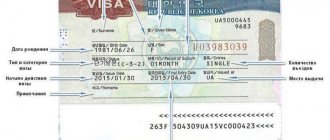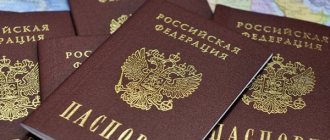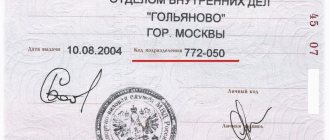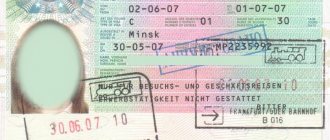Citizens of foreign countries staying on the territory of the Russian Federation often neglect the rules of staying within its borders and commit various offenses. To protect the population of their country and ensure national security, a set of federal laws was adopted, in which one of the penalties for such persons is administrative deportation from the Russian Federation.
What is the expulsion of a foreigner from the Russian Federation?
Important! Please keep in mind that:
- Each case is unique and individual.
- A thorough study of the issue does not always guarantee a positive outcome. It depends on many factors.
To get the most detailed advice on your issue, you just need to choose any of the options offered:
- Use the online chat in the lower corner of the screen.
- Call: Federal number: +7 (800) 511-86-74
Administrative deportation from the Russian Federation is a state punitive measure applied to a foreign citizen and stateless person due to his failure to comply with the established rules of stay or committing illegal actions on the territory of the country. Legislatively, this type of liability is provided for in Art. 3.2 Code of Administrative Offenses of the Russian Federation dated December 30, 2001 No. 195-FZ. The categories of persons subject to such punishment and the specifics of the procedure are fixed in Art. 3.10 Code of Administrative Offenses of the Russian Federation dated December 30, 2001 No. 195-FZ.
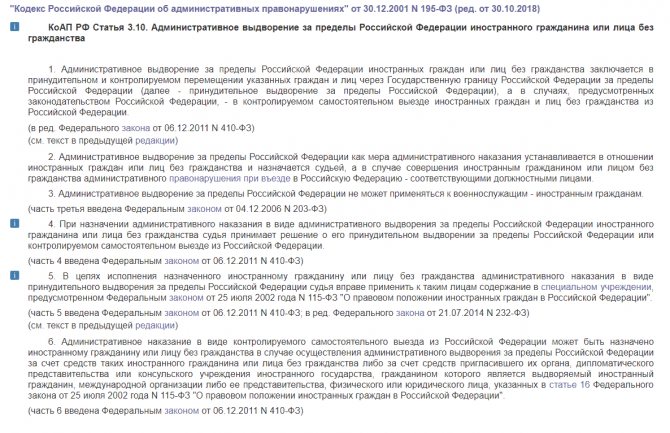
Expulsion is the departure of a foreigner from its territory, carried out voluntarily or under escort, if the court has appointed this measure of responsibility for actions of an unlawful nature.
When approving such a punishment in the Code of Administrative Offenses of the Russian Federation, the President wanted to achieve the following goals:
- protecting the state from internal and external threats;
- regulation of public relations;
- preserving the health and life of subjects with Russian citizenship;
- ensuring constitutional human rights;
- prevention of possible repetitions of illegal actions on the part of other persons.
The decision to expel a person from the country must indicate the period of the entry ban.
The legislative framework
It is worth knowing what regulations and laws govern deportation from the Russian Federation in order to understand your rights.
Issues of administrative expulsion are regulated by the following laws:
- Article 3.10 of the Code of Administrative Offenses of the Russian Federation.
- Chapter 18 of the Code of Administrative Offenses of the Russian Federation.
- Federal Law No. 115 “On the legal status of foreign citizens in the Russian Federation.”
- Federal Law No. 114 “On the procedure for leaving the Russian Federation and entering the Russian Federation.”
- Federal Law No. 410 “On Amendments to the Federal Law “On Bailiffs” and Certain Legislative Acts of the Russian Federation.”
- Decree of the Government of the Russian Federation No. 382 “On placing a mark on the prohibition of entry into the Russian Federation of certain categories of foreign citizens and stateless persons.”
- Order of the Ministry of Internal Affairs of Russia and the Federal Migration Service of Russia No. 758/240 “On the organization of activities of the Ministry of Internal Affairs of the Russian Federation, the Federal Migration Service and their territorial bodies for the deportation and administrative expulsion from the Russian Federation of foreign citizens or stateless persons.”
- Resolution of the Plenum of the Supreme Court of the Russian Federation dated December 19, 2013 No. 40 “On amendments to the Resolution of the Plenum of the Supreme Court of the Russian Federation dated March 24, 2005 No. 5 “On some issues that arise for courts when applying the Code of the Russian Federation on Administrative Offenses”, others legislative and by-laws."
These
are not all laws and acts. We have listed the important ones that you can refer to if problems arise.
Why are they expelled from the country?
The Code of Administrative Offenses of the Russian Federation contains a list of offenses committed by foreigners and stateless persons, which presupposes deportation as a punishment. List of illegal actions for which one is expelled from the Russian Federation:
| Offense | Article number in the Code of Administrative Offenses |
| Acquisition, sale and possession of drugs or substances that affect the human psyche without legal permission. | Art. 6.8 |
| Using drugs or psychotropic substances without a doctor’s prescription, as well as avoiding medical examination, treatment and rehabilitation. | Art. 6.9 |
| Propaganda of drugs and substances that alter a person’s mental state. | Art. 6.13 |
| Purchasing, marketing, transporting or storing precursors without legal permission. | Art. 6.16 |
| Inducing minors to engage in non-traditional sexual contacts through their propaganda. | Art. 6.21 |
| Offenses when crossing the state border of the Russian Federation or the regime of stay on its territory. | Art. 18.8 |
| Carrying out labor activities within the Russian Federation without legal grounds. | Art. 18.10 |
| Evading immigration control. | Art. 18.11 |
| Providing false information when going through immigration control. | Art. 19.27 |
| Evasion from execution of administrative punishment. | Art. 20.25 |
| Neglect of the rules of conduct when attending an official sporting event. | Art. 20.31 |
Important! For some types of offenses, deportation is combined with the payment of a fine, which the citizen must pay within 1 day after the court decision enters into force.
Main reasons for expulsion
Forced departure of foreigners from the country may also be an additional measure of punishment for violators
Foreigners who have violated the norms of the Code of Administrative Offenses (Articles 18.1 – 18.19) can be expelled.
Forced departure of foreigners from the country may also be an additional measure of punishment for violators. The main type of punishment is a fine.
Note that AB is a fairly common case.
Cases can be considered in a short time, and the subject:
- Translators are not provided.
- They do not cooperate and do not notify his relatives in the Russian Federation.
- Labor and other documents will not help to avoid punishment.
The defendant has only one thing left to do - file an appeal, citing the provisions of the Code of Administrative Offenses and the CAS.
Violation of the State Border regime of the Russian Federation
Migrants can stay in the country for no longer than 90 days.
Exception:
- Situations in which the period can be increased according to the law.
- Cases when the period can be extended in accordance with the provisions of Federal Law No. 114 and Federal Law No. 115.
If a foreigner exceeds the established period of stay and does not leave the country on time, he will be prohibited from entering for the next 3 years. The calculation will begin from the date of departure from Russia.
Violation of the regime at checkpoints across the State Border of the Russian Federation
The main task is the successful control of supervisory authorities over the flow of migrants entering the country
The CAD regime operates not only on the basis of domestic legislation (primarily, in accordance with the Federal Law “On the State Border”), but also on the basis of international treaties.
There are separate rules for each type of border (one-way and two-way, passenger, sea, etc.).
The main task is the successful control of supervisory authorities over the flow of migrants entering the country.
In addition to the decision on deportation, the offender will be forced to pay a small fine (from 1,000 rubles).
A migrant who has citizenship of any country (especially one with which the Russian Federation has concluded agreements) will most likely receive a warning for the first time. But a stateless person can be expelled from Russia immediately.
Violation by a foreign citizen or stateless person of the regime of stay in Russia
These include narrow offenses:
- Violation of the transit regime.
- Lack of documents allowing you to move and live within Russia.
- Failure to comply with migration registration deadlines.
- Lying about the purpose of the visit to the country (must be documented).
- Falsification of documents.
All this is considered an administrative offense, and a fine is usually imposed for the committed act - from 2,000 to 5,000 rubles. A decision on expulsion in this regard is rarely made.
Violation by a foreign citizen or stateless person of the rules for attracting and using foreign labor in the Russian Federation
We can talk not only about a person’s failure to comply with the restrictions in force in a given industry, unofficial or illegal employment and work of migrants.
In practice, there are situations when a foreigner violated the rules due to the fact that he failed to renew his visa on time.
Accordingly, the person must leave the country the next day after expiration. The result is the same - expulsion from the country.
Immigration violation
This type includes violations of the conditions under which a migrant can be allowed into the country.
Among them:
- Absence of serious viral diseases.
- No outstanding convictions in your home country.
- Timely entry and exit from Russia, etc.
Who can't they deport?
According to the Code of Administrative Offenses of the Russian Federation, deportation from the country is not assigned to the following categories of foreigners:
- military personnel;
- persons waiting to receive political refugee status or who already have it;
- consuls;
- employees of diplomatic missions;
- subjects who have lost refugee status, but are unable to return home for reasons beyond their control (war, serious epidemic, famine, political persecution).
Foreigners who were under 16 years of age at the time of committing the offense are not responsible for their actions. Therefore, the judge cannot give them such a punishment.
If a court order for expulsion is received by one or both parents, then in accordance with paragraph 4 of Art. 9 of the Convention on the Rights of the Child, a minor may be separated from them, especially if this is necessary in his interests. At the same time, the authorities must take into account the fact that there is a child in the family who is under 18 years of age, and assign this type of responsibility to parents in special cases.
For what period is a foreign citizen deported?
The timing of the administrative expulsion of foreigners from the Russian Federation depends on the severity of the offense. In the case of initial sentencing, the period of entry ban can range from 1 to 5 years.
Important! In case of return to the Russian Federation and repeated violation of its laws, which require the imposition of a penalty in the form of deportation, the period of liability for the committed action is 10 years.
If a foreigner refused to comply with the court’s order voluntarily and hid from the authorities monitoring the process of his expulsion, then the sentence is also increased to 10 years.
In this case, the subject does not receive written notice of the ban period. This data is transmitted to the border service, which will not allow a foreigner to enter the territory of the Russian Federation if the period of validity of the punishment has not yet expired.
Administrative expulsion from the Russian Federation for migration offenses does not violate constitutional rights
The Constitutional Court published Determination No. 862-O/2020 on the complaint of a citizen of Uzbekistan under Part 1.1 of Art. 18.8 Code of Administrative Offenses of the Russian Federation, paragraph 2 of Art. 5 of the Law on the Legal Status of Foreigners in Russia and Art. 25.10 of the Law on the procedure for leaving and entering the Russian Federation.
Previously, courts of general jurisdiction found Sergei Valeev guilty of committing an offense under the article of the Code of Administrative Offenses he contested, which provides for liability for violation by a foreigner or stateless person of the regime of stay (residence) in Russia, expressed in the absence of documents confirming such a right, or in the event of the loss of such documents - in failure to submit a corresponding application to the authorized body or evasion of leaving the state after a certain period of stay. Then the courts fined him 2 thousand rubles. and ordered his expulsion from Russia.
According to the applicant, the norms he disputed do not comply with the Russian Constitution, since they allow a foreign citizen to be recognized as illegally staying on the territory of the Russian Federation, and to bring him to administrative responsibility with the imposition of punishment in the form of administrative expulsion without taking into account his family ties on the territory of Russia and other significant factual circumstances.
Having studied the materials of the complaint, the Constitutional Court found no grounds for accepting it for consideration. The highest court recalled that, according to paragraph 2 of Art. 5 of the Law on the Legal Status of Foreigners in Russia, a foreign citizen is obliged to leave its borders upon the expiration of his visa or other period of temporary stay established by such law or an international treaty of the Russian Federation, with the exception of a number of cases. As follows from Part 1 of Art. 25.10 of the Law on the procedure for leaving and entering the Russian Federation, a foreigner who evades leaving Russia after the expiration of his stay in the country is liable in accordance with its legislation. In particular, such liability is provided for in Part 11 of Art. 18.8 of the Code of Administrative Offenses of the Russian Federation in the form of an administrative fine in the amount of 2 to 5 thousand rubles. with administrative expulsion from the state.
With reference to a number of its legal positions, the Court recalled that administrative deportation from Russia as a mandatory punishment for certain migration offenses does not contradict the Constitution, and the accuracy and clarity of the rules for imposing such punishments prevent excessive discretion and abuse in the process of applying administrative sanctions. At the same time, the Constitutional Court emphasized, when considering relevant cases, the courts should not be limited to a formal approach, but are obliged to investigate and evaluate real circumstances (for example, take into account marital status and other extraordinary circumstances worthy of attention when deciding the issue of both the need for deportation from the Russian Federation and temporary residence on its territory). In addition, the imposition of an administrative penalty provided for by law in certain circumstances may contradict the goals of administrative responsibility and unduly restrict constitutional rights and freedoms.
In this regard, the Constitutional Court found that the contested norms allow the courts, taking into account all the factual circumstances of a particular case, not to impose an administrative punishment on the offender in the form of administrative deportation from the territory of the Russian Federation, and therefore cannot be regarded as violating the constitutional rights of the applicant in the specified case. aspect. In addition, the Constitutional Court of the Russian Federation once again recalled that it is not within its competence to verify the legality and validity of decisions of courts of general jurisdiction adopted in the applicant’s specific case.
The head of the legal administrative practice department, Andrei Fomenko, noted that, based on the contested norms, it can be assumed that a foreigner who was married to a Russian citizen did not bother with the registration or renewal of permits, for which he was held accountable in the form of administrative expulsion, which, in turn, turn entails a five-year entry ban. According to the expert, the constitutionality of the expulsion of foreign citizens as punishment for administrative violations has been actively contested since around 2015, when liability for migration violations was greatly tightened.
How does the process work?
The procedure for expelling a foreigner from the country is regulated by Art. 34 of Federal Law No. 115-FZ of July 25, 2002
The procedure goes as follows:
- representatives of the Ministry of Internal Affairs or the Federal Migration Service detain a foreigner when they detect offenses against him;
- draw up a case that involves bringing such a citizen to justice, and transfer it to the court, which makes a decision on deportation.
Important! After receiving a court decision, a person can challenge it within 10 days by filing an appeal.
If an illegal act was committed at a border checkpoint, then the decision on expulsion can be made by border guards.
On one's own
The foreigner receives a court decision and voluntarily leaves the Russian Federation within 5 days from the date of its entry into force (Part 6 of Article 32.10 of the Code of Administrative Offenses of the Russian Federation).
Independent expulsion involves the departure of a subject using his own funds provided by the state of which he is a citizen or by the person who invited him. The fact of leaving the country is registered by employees of the Federal Migration Service. They draw up a special act (attach to the court case) and notify the Ministry of Foreign Affairs, whose employees must report the incident to the diplomatic department of the expelled foreigner.
Forcibly
This type of punishment involves placing a foreigner by court decision after receiving an order for deportation to a special institution until the deportation is carried out.
Bailiffs are obliged to hand over the foreigner to the border guards of the country to whose territory he is being sent. At the same time, they must buy a ticket for the person and escort him to the border checkpoint. Then the bailiff draws up an act and reports the deportation of the person to the Federal Migration Service and the Ministry of Foreign Affairs. Ministry employees notify employees of the diplomatic department belonging to the country of the foreigner who left the territory of the completion of the administrative punishment procedure.
The procedure for administrative expulsion from the Russian Federation on a voluntary and compulsory basis
The procedure for the administrative expulsion of foreigners from Russia depends on the type of expulsion. A migrant can leave the country independently or accompanied by the migration service.
For voluntary deportation, the procedure is as follows:
- A citizen receives a notification from the migration service that he is about to leave the country. The document indicates the reason for the expulsion, and also that the materials will be sent to the court.
- The court issues a ruling, as a result of which the foreigner must leave the Russian Federation.
- Then the foreign citizen receives the corresponding court decision.
- Next, he is obliged to cross the border of the Russian Federation within 5 days.
The fact of movement outside Russia will be recorded. Employees of the migration service of the Department of Migration of the Ministry of Internal Affairs must prepare supporting documentation. All costs associated with the citizen’s relocation will be borne by him.
In case of forced administrative deportation
the procedure is almost the same. However, the main difference is that a foreign citizen will be accompanied to the Russian border by a migration service officer. In case of such a trip abroad to Russia, the Embassy of the foreigner’s country or the migration authority bears the costs of the move.
Before administrative deportation from the Russian Federation, a foreign citizen or stateless person, by a court decision, may be held in special premises of the border service or internal affairs bodies (Article 32.10 of the Administrative Code).
Differences between expulsion and deportation
In order for citizens to understand the difference between these two concepts, lawyers have highlighted the following features:
- reason for departure. Expulsion is a measure of punishment for carrying out an illegal action, and deportation is carried out when it is discovered that there is no legal right to stay in the Russian Federation;
- decision-making body. The decision on expulsion is adopted by the court, and on deportation - by the Federal Migration Service;
- possibility of departure. In the first case, the territory of the country is left independently or under escort, and in the second - only under the control of bailiffs;
- deadline for appeal. Expulsion can be contested within 10 days, and deportation within 3 months.
Duration of expulsion of foreign citizens from the Russian Federation
What circumstances determine the period for expulsion of foreign citizens from the country?
If a foreign citizen has not prepared documents for temporary stay in the Russian Federation, deportation is carried out for a period of up to 3 years.
If a person has committed an administrative offense within a year for which deportation is provided, then the duration of deportation is also carried out for a period of up to 3 years.
If a person is employed illegally, administrative expulsion is equal to five years.
If a foreign citizen commits an administrative offense, provided that a sanction in the form of deportation was previously applied to him, then the period for the second deportation is up to 10 years.
Is it possible to cancel the expulsion?
Any court decision can be appealed. There are the following situations when a foreigner can have this penalty cancelled:
- entering into marriage with a citizen of the Russian Federation. If the subject is the sole breadwinner of the family and is dependent on a minor or seriously ill spouse, then the deportation order is most often canceled;
- the person is studying full-time at a Russian university or other educational institution;
- a foreigner urgently needs to undergo medical procedures in a Russian clinic;
- the presence in the country of close relatives with whom the person maintains close relationships;
- When making the decision, human rights and legal norms were violated (failure to provide a lawyer).
Important! The appeal to the court of appeal must be submitted no later than the end of the 10-day period from the date of the decision.
Methods of challenging
Previously, it was possible to appeal a punishment, if it was established by border guards, to a higher authority. But after the innovations adopted in the legislation in 2021, such a procedure is carried out only in court.
When submitting an application for cancellation of an administrative penalty, it must indicate:
- personal data of the plaintiff;
- name of the court where the application is filed;
- the type of offense for which the penalty was adopted;
- details of the contested resolution;
- the reasons why it should be cancelled;
- date and signature.
An appeal is filed and registered with the court that made the decision on deportation. Its employees must transfer it to a higher authority, where consideration is carried out within 1 day from the date of filing the complaint.



